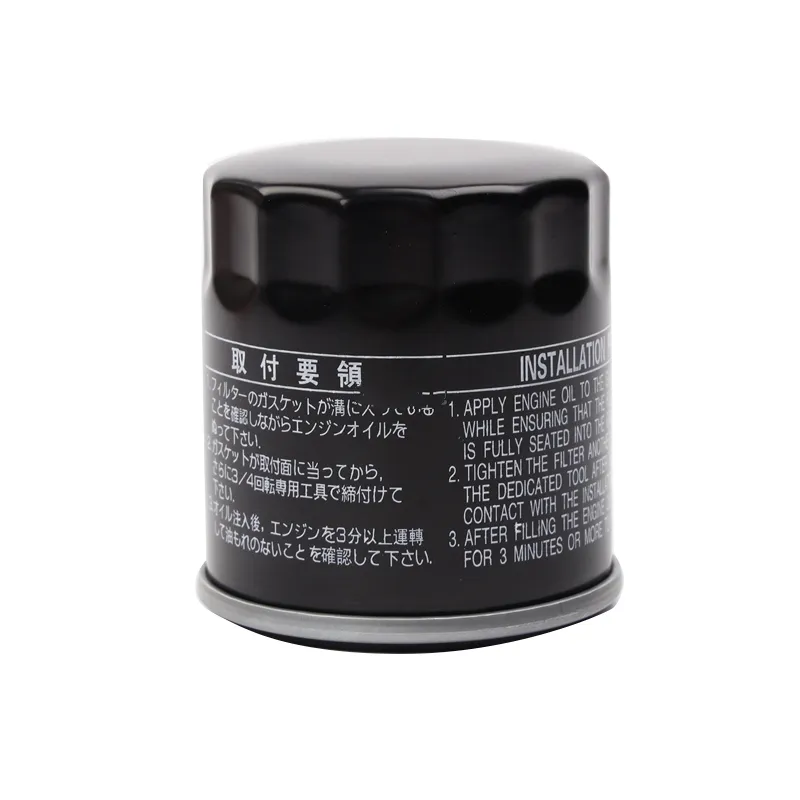Apr . 17, 2024 10:00 Back to list
WHAT HAPPENS IF YOU DON’T CHANGE YOUR OIL FILTER? Oil Filter
90915-YZZE1 OIL FILTER FOR TOYOTA ENGINE 90915-YZZE1
WHAT IS THE OIL FILTER?
The oil filter helps keep your engine oil clean. As oil cycles through your engine, it can pick up dirt, debris, and other impurities. Contaminants can thicken the oil, making your engine work harder to circulate it. They can even damage parts of your engine. Your oil filter works to remove impurities from the oil to help keep your engine in peak condition.
WHEN TO REPLACE YOUR OIL FILTER
It’s generally recommended you replace your oil filter each time you change your oil. Some oil change myths may make you think this should happen every 3,000 miles. However, you should always reference your vehicle manufacturer’s maintenance recommendations for oil change and filter replacement intervals.
WHAT HAPPENS IF YOU DON’T CHANGE YOUR OIL FILTER?
If you’ve ever DIYed an oil change, you might have asked yourself, “Do I have to change my oil filter?” Yes! While nobody will stand over you and force you to replace the filter, not doing so can lead to engine problems.
Since the filter traps contaminants, it can become clogged as time passes. The more clogged the filter gets, the buildup of pressure within the filter can eventually open the filter’s bypass valve. When this valve opens, unfiltered oil circulates through the engine to prevent oil starvation. This unfiltered oil can wreak havoc on your engine, possibly resulting in damage and a shorter engine lifespan.
Avoiding engine issues is worth the effort of replacing the oil filter. Consider making an appointment at your local Firestone Complete Auto Care for an oil change and oil filter replacement.
SIGNS YOU NEED A NEW OIL FILTER
While you should follow the manufacturer's recommended maintenance schedule, you may need to replace your oil filter sooner than expected. One potential symptom of a failing oil filter is low oil pressure since a leaky filter can cause your oil pressure to drop.
Another sign you may need a new filter is in instances of contamination. If the oil on the dipstick or in the valve cover has visible signs of external contamination (i.e., small gritty particles) or looks like mayonnaise or an emulsion of different fluids, have a professional technician investigate the root cause of this issue.
OIL FILTER REPLACEMENT FAQS
CAN YOU ADD OIL WITHOUT CHANGING THE FILTER?
Most vehicle manufacturers suggest changing the oil filter during each oil change, so check there first. If you change your oil more often than the recommended maintenance interval, you may be able to change it without also changing the oil filter. However, it’s best practice to always change the filter during an oil change.
CAN YOU CHANGE AN OIL FILTER WITHOUT CHANGING THE OIL?
On the flip side, changing the oil filter without immediately changing the engine oil is possible in very limited situations, but you'll still want to follow your vehicle manufacturer’s recommendations.
However, let’s say you change your oil at home but forgot to buy a replacement filter. Once you have your new filter, you can easily swap it out without emptying your oil. Note that some oil will come out when you remove the old filter.
After changing the filter, check your engine oil level since oil filters can hold half a quart or more of oil. Then, top it off if as necessary.
-
ANTFIL Premium Oil Filters-Ultimate Protection for Your Engine
NewsJul.21,2025
-
ANTFIL Oil Filters-Superior Protection for Toyota&Nissan
NewsJul.21,2025
-
ANTFIL Fuel Filters-Durable Engine Filters
NewsJul.21,2025
-
ANTFIL Filters-Protection For Your Products
NewsJul.21,2025
-
ANTFIL Cabin Filter-Clean Air for Your Drive
NewsJul.21,2025
-
ANTFIL Air Filters-Pure Air Solutions for Every Space
NewsJul.21,2025



